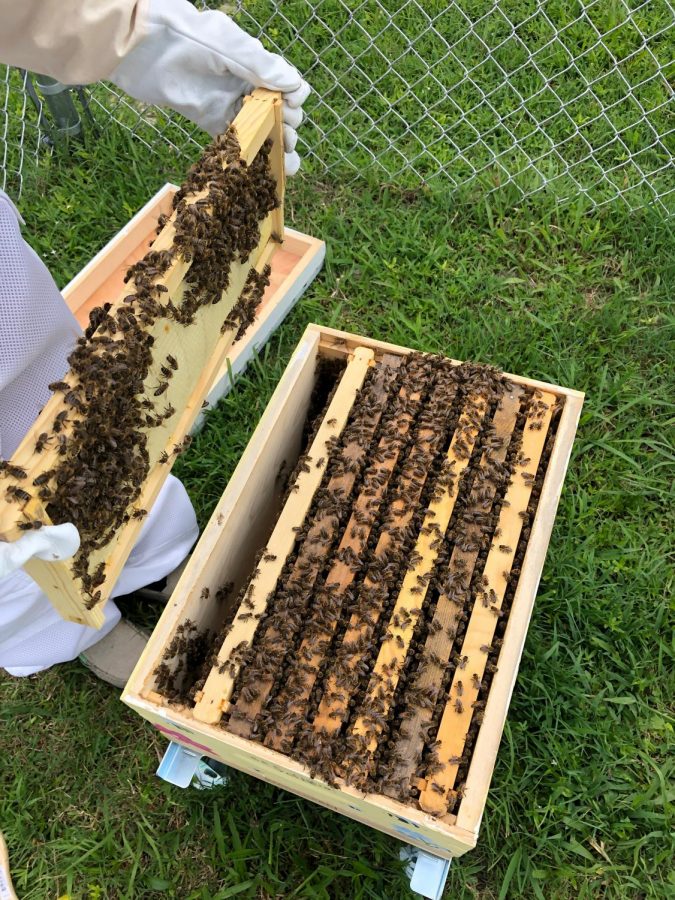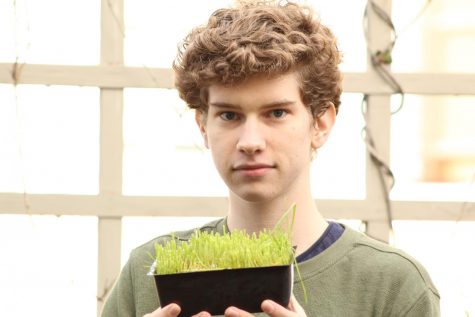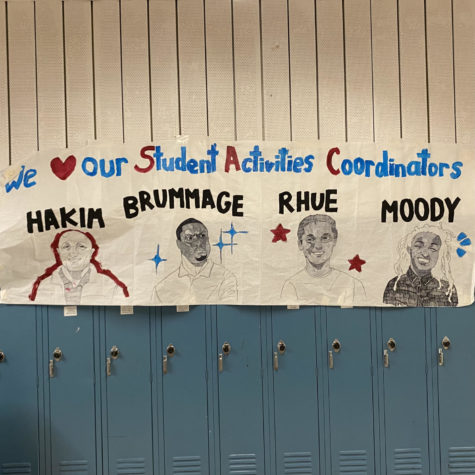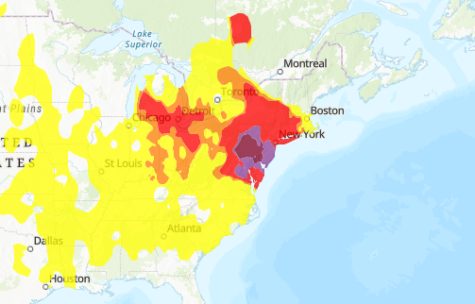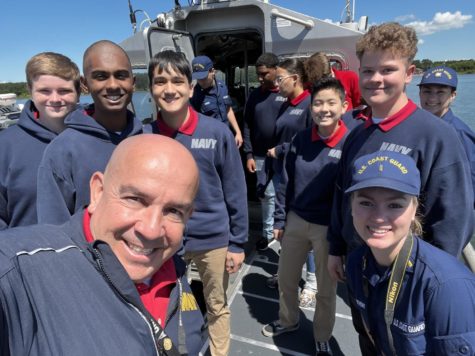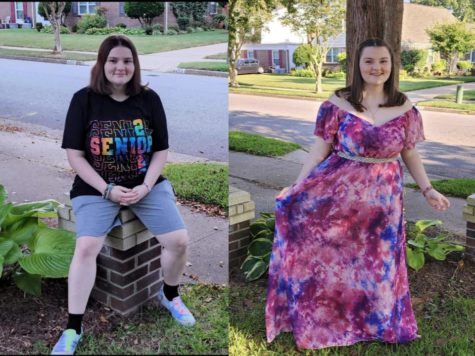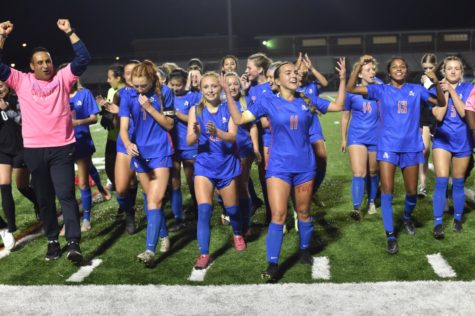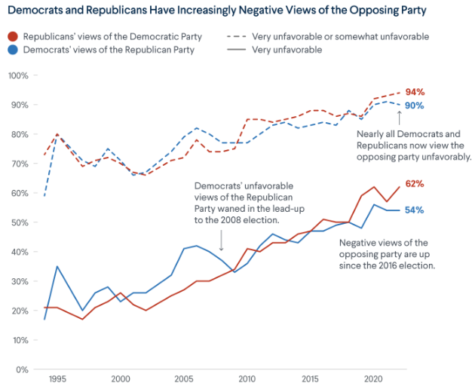Bee their voice: PA’s bee activists work far beyond the hive
September 30, 2019
By John Kibler
Over the past decade, the urgency of environmentally concerned policy making has multiplied each year, as new studies continuously release data uncovering the potential fatalities of our climate and pollution struggles. As citizens enter crisis mode and do all that is possible to spark change, we have seen a multitude of activist organizations and events lobby for action — we could clearly see an obvious example Sept. 20, with multiple climate strikes happening around the world, including an event held at PA. But perhaps the most important changes happen under smaller, local organizations. And at PA, look no further for such organization than Junior Alyssa Perez and her bees.
Perez initially aimed to increase awareness for the bee population—both its importance and its decline—as the main goal for her MYP Personal Project. To do so, she created an Instagram page (@alyssasbees, well on its way to 1000 followers) to find a platform online, and eventually she started using her online following to advocate for a wider stage of environmental issues, as well as for social decency. One recent post explains the counter productivity of single-use plastic bottles in our country and other developed societies, but also their importance in third-world nations. Another gives tips on how to have the best school year possible, captioning a picture of a flower. Perez continuously stays active on the account to reach as many social media users as possible.
The 2019-20 school year also saw Perez’s founding of PA’s ‘Bee Their Voice’ club, where she aims to spread awareness and plant inspiration directly into our student body.
“The reason why we started [Bee Club],” said Perez, “was that bees are declining at an alarming rate, and a lot of people don’t really understand how important they are to our environment—and not just our environment, but our ecosystem as a whole, and how we’re kind of all just one big ecosystem working within each other.”
The club was met with buzzing excitement (pun fully intended) as Perez aspired to start a hive at PA. She met with retired PA teacher and local beekeeper Sharon Boudreau, who had an overpopulated hive. Over the summer Perez and the bee club sponsor, Monica Lang, went to Boudreau’s hive to “split it,” bringing a portion of her bees to kick start PA’s beehive—which you can now visit next to the garden in between the 600 hallway and the main school.
Assistant Principal Ryan O’Meara is part of the VBCPS innovation cohort. He provided a grant from the City to help build the hive.
Perez found her passion for bees in eighth grade at Kemps Landing Magnet School, when she centered her Capstone project around them and educated younger elementary students about the importance of bees.
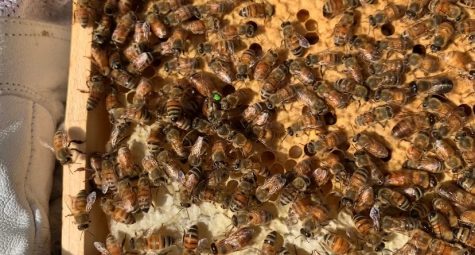
“I really wanted to take it a step further in high school and really bring more attention to the declining populations as well as bring attention to the other types of bees that are in decline,” she said.
As Perez’s Personal Project adviser, and having an interest in bees as well, Lang was enthusiastic to help Perez reach this goal.
“Quite a few years ago, I saw a documentary,” said Lang. “…It just stuck with me and I couldn’t get away from it. It was, ‘Where have all the honeybees gone?’ and as an IB teacher I just kept thinking of all the interdisciplinary connections, like looking at the data, looking at the honey, global impact, trade, everything.”
That documentary led Lang to present the problem to PA’s IB teachers, who brainstormed connections that could be made to their own material. Lang then worked with three MYP teachers who were inspired by these connections: Biology teacher Ashley Karunaratne, Geometry teacher Jaclyn Stroud, and Algebra II/Trigonometry teacher Cindy Edwards.
Together, they created an interdisciplinary unit for their students, aiming to solve the problem of Colony Collapse Disorder—studying the ecological effects in Biology, studying the data and relating it to those effects in Algebra, and in Geometry studying the significance of the hexagon.
This shared passion for bees between Lang and Perez founded the partnership that would bring us Bee Club, which continues to educate students and provide a platform for them to get involved.
This direct involvement in Bee Club concentrates on four skill sets, in addition to the leadership team: beekeeping, creativity, publicity, and fundraising. Each skill set has its own committee, and plays its respective role in club affairs.
The first meeting of the school year took place Sept 4, and after a presentation in the West Building’s multipurpose room, some members suited up and worked on the hive to hunker down the bees in preparation for Hurricane Dorian. (That process, surprisingly, is not intricate at all; it mostly entails feeding the bees their scheduled dose of sugar water and placing a brick on top of the hive so that it doesn’t blow away. Otherwise, the bees remain relatively unaffected.)
“It was a lot of first-timers [at the meeting], so we really wanted people to find that connection with the environment,” said Perez.
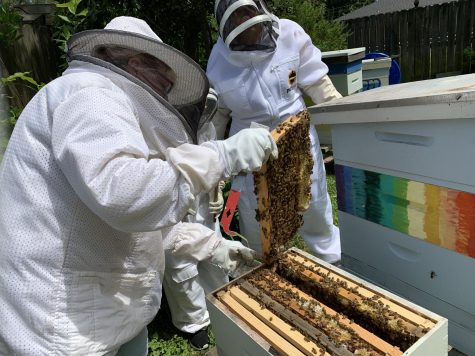
Perez and Lang check up on the hive one to two times a week, and Lang sometimes feeds the bees during school hours along with Instructional Technology Specialist Stephen Delaney. This upkeep is especially important in the heat of the summer, when the bees are most hungry. In the winter, however, the bees are to some extent self-sustaining; starting around October, the females banish the drones (male honey bees) from the hive. The Queen has the ability to make more drones on her own, and does so as soon as the temperatures begin to rise in the spring. In the spring and summer, the bees make enough honey to feed themselves in the cold months, and they only require an equilibrated temperature of 95-98 degrees within the hive.
And now that Bee Club has fully established their hive, Perez plans to extend their reach and subject matter heading into the 2019-20 school year.
“Last year… I mainly talked about environmentalism,” said Perez, “and ways that we can all become involved [politically], but this year I’ve sort of taken a more social approach to it, because I realize how connected we are to the environment, but also to each other; and how a lot of our issues are shared and they all stem from the environment. So it’s important that we take note and dismantle the oppressive systems that are plaguing our society.”
As part of bringing about this social change and highlighting the receptiveness of the PA community, the club is forging a new relationship with the West Building, and is looking forward to working with the students to enhance involvement.
“We really want to build a community where everyone is given a voice and everyone has equal opportunity, we’re going to be diving in more with the West building more and getting them more opportunities to get involved in things with us,” said Perez, and explained how acts such as these instigate the motto ‘Bee their voice.’
On Sept. 20, eight Bee Club leadership representatives (not including Perez, who was at D.C.’s climate strike) took a field trip to the Air Show and worked at an event that informed local fifth graders in the Hampton Roads area of the IB Program. Each representative was skilled in a specific subject—including engineering, math, science, and globalisation—and delivered their subject matter in a way that connected the social and environmental issues of bees. The goal was to educate the elementary students at a grassroots level.
“It’s kind of like the message of PA,” said Perez, in referencing the interdisciplinary social and environmental activism which she strives to promote.
“Find your community and treat others the way that they wish to be treated, as well as exercising allyship and fighting for equity. By Bee Club being the way that it is…focused on the environment but also understanding the connection between social, environmental, climate issues, we’re creating an atmosphere for people to question the way that things have been working and to empower them to make a difference.”
Fun Fact: Honey is the only food that never spoils. The ancient Egyptians used it to preserve the dead, so theoretically you could eat honey out of an ancient Egyptian tomb and it would still taste the same as it did in that time.

